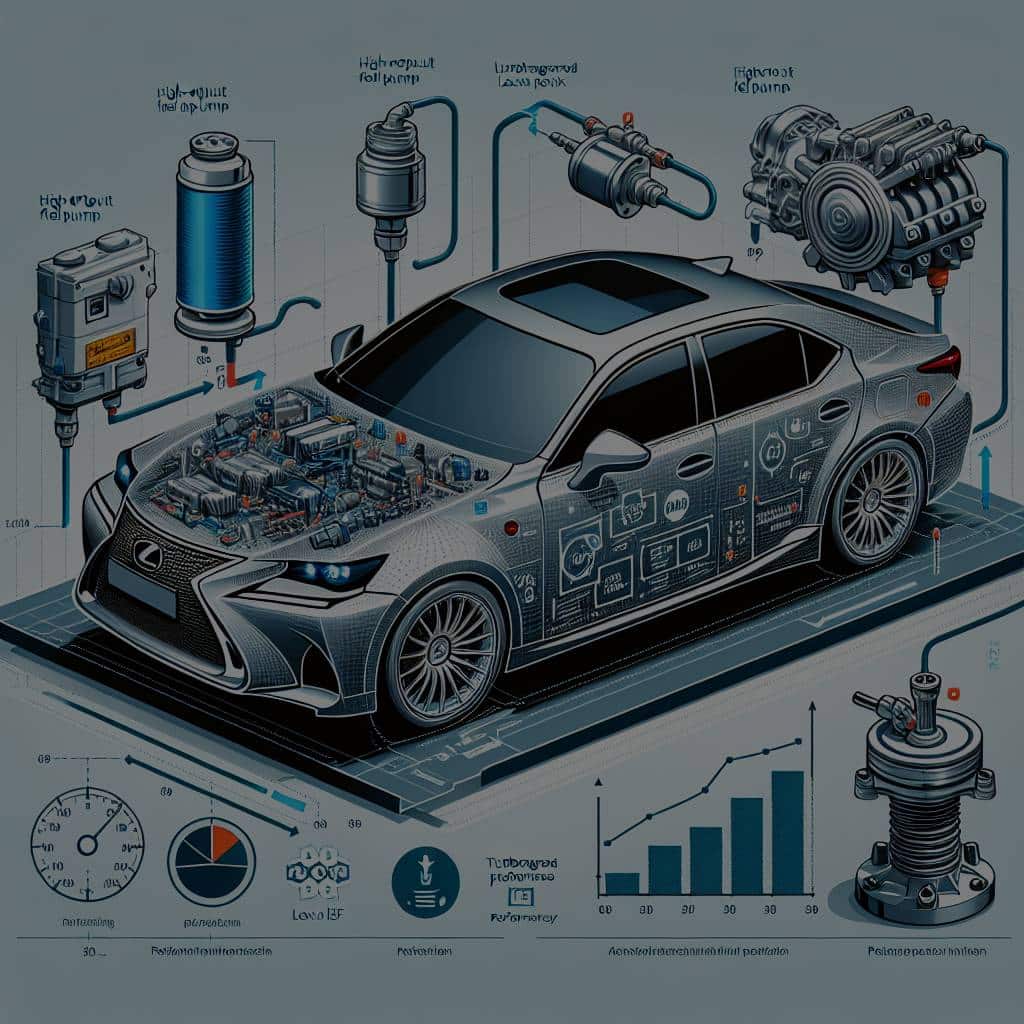Can a High-Output Fuel Pump Improve the Performance of a Turbocharged Lexus ISF?

As car enthusiasts and performance tuning experts, we constantly find ourselves tinkering, tweaking, and testing various modifications to our cars’ engine systems. We do this in the quest for that extra bit of power, that additional surge of adrenaline when we hit the throttle. In our latest experiment, we’re delving into the question: Can a high-output fuel pump improve the performance of a turbocharged Lexus ISF?
Understanding the Function of a Fuel Pump
Before we can answer our main question, it’s crucial to understand the role of a fuel pump in your car’s engine system. The fuel pump is an integral component of your car’s fuel system. It’s responsible for delivering fuel from the tank to the engine at the appropriate pressure required for performance demands.
Also to discover : How to Perform a Leak-Down Test on a Vintage Car Engine?
As your car accelerates, more fuel is needed to maintain the correct air-fuel ratio. This is where a high-output fuel pump comes into play. With increased capacity, it can deliver more fuel faster, ensuring that your engine doesn’t run lean when you’re demanding high performance.
In a turbocharged car such as the Lexus ISF, the need for a more capable fuel pump becomes even more crucial. The turbocharger pushes more air into the cylinders, which requires more fuel to maintain the optimal air-fuel ratio. A stock fuel pump might struggle to keep up with these demands, potentially limiting your car’s performance.
Also to discover : How to Adjust the Valve Lash on an Old School Muscle Car?
The Lexus ISF and Its Turbocharger System
The Lexus ISF is a flagship performance car from Toyota’s luxury vehicle division. It’s built for speed, power, and agility, boasting a high-performance V8 engine that’s already impressive in its stock form. But, as many of you know, there’s always room for improvement.
When you add a turbocharger to the mix, you’re essentially forcing more air into the engine’s combustion chamber. This, in turn, allows the engine to burn more fuel, creating a bigger bang and generating more power. The turbocharger can significantly expand the Lexus ISF’s power and performance, but only if the car’s fuel system can keep up.
That’s where the high-output fuel pump comes into play. By ensuring a steady and robust supply of fuel, it allows the turbocharged engine to operate at its full potential without the risk of running lean.
The Impact of a High-Output Fuel Pump
Now, let’s get down to the nuts and bolts of our question. Will a high-output fuel pump improve the performance of a turbocharged Lexus ISF? In theory, yes. In practice, it’s a little more complicated.
With the turbocharger pushing more air into the cylinders, the fuel demand naturally increases. If the fuel pump can’t deliver at this high rate, the engine may run lean, potentially causing damage and certainly affecting performance. By ensuring a sufficient fuel supply, a high-output fuel pump can prevent this issue, allowing your Lexus to run at its full turbocharged potential.
However, it’s not quite as simple as ‘click and install’. Upgrading to a high-output fuel pump also requires a subsequent tune of the engine to adjust to the increased fuel flow. The fuel injectors, engine control unit (ECU), and other components will need to be adjusted accordingly to ensure that the increased fuel supply is used efficiently.
The Final Verdict
Does a high-output fuel pump improve the performance of a turbocharged Lexus ISF? The answer is yes – but with a few important caveats.
A high-output fuel pump can certainly deliver the fuel required to meet the demands of a turbocharged engine, but it’s not a standalone solution. To truly boost performance and prevent potential damage, an engine tune-up is crucial following installation.
In addition, while the fuel pump is a crucial component of the fuel system, it’s not the only one. Other factors, such as the quality of your fuel injectors and the efficiency of your ECU, can also impact performance.
So, while installing a high-output fuel pump can certainly help your turbocharged Lexus ISF reach its full potential, remember that it’s part of a larger system. For the best results, consider it as one step in a comprehensive performance upgrade.
In the end, such an upgrade should be a calculated decision based on your car’s specific needs and your performance goals. Don’t hesitate to seek professional advice if you’re unsure – after all, it’s your car and your investment. The quest for power and performance is a journey, and every modification is a step along the way.
Understanding the Upgrade Process
To truly comprehend the influence of a high-output fuel pump on a turbocharged Lexus ISF, it’s vital to understand the upgrade process. It isn’t as simple as a click and expand operation. While a high-output fuel pump can deliver more fuel faster, it needs to be effectively integrated into the existing fuel system for optimal performance.
Firstly, the fuel injectors have to be modified to cope with the increased fuel flow. These devices are responsible for spraying the fuel into the engine’s combustion chamber at the correct time and in the right quantity. In tandem with the fuel pump upgrade, the injectors also need to be adjusted or replaced to handle the higher fuel flow.
Secondly, the Engine Control Unit (ECU) needs to be recalibrated. This onboard computer is responsible for controlling various parameters such as the air-fuel ratio, ignition timing, and idle speed. Changing the fuel pump will affect these parameters, which is why an ECU recalibration is necessary after the upgrade.
Lastly, the fuel system, which includes the fuel tank, fuel lines, and pressure regulators, also needs to be checked and possibly upgraded. These components work in unison with the fuel pump and thus, their efficiency directly impacts the overall performance.
Across forum members, it’s agreed that the upgrade process must follow a holistic approach rather than being limited to one component. To maximize the potential of your turbocharged Lexus ISF, consider investing in a comprehensive upgrade rather than a standalone fuel pump upgrade.
Maximizing Performance with High RPM and Forced Induction
As the Lexus ISF operates at high RPM, it’s important to modify the fuel system accordingly. Since turbochargers rely on the exhaust gases produced at high RPM to compress the incoming air, the fuel demand at these speeds is significantly more. This is where forced induction comes into play, which is another significant aspect of turbochargers, amplifying the air intake and thus, necessitating an increase in fuel supply.
A supercharger kit can be a valuable addition to your turbocharged Lexus ISF. It’s essentially a form of forced induction that compresses the air flowing into your engine. This compressed air results in a greater amount of oxygen available for combustion with the fuel, bringing about a significant increase in power.
However, bear in mind that a supercharger operates at high RPM, increasing the demand for fuel. Hence, a supercharger kit coupled with a high-output fuel pump can maximize the performance of your turbocharged Lexus ISF.
In this context, it’s worth mentioning the importance of a return system in your fuel lines. It ensures that any extra fuel not used by the injectors is returned to the fuel tank, maintaining a consistent pressure at the fuel rail and preventing the fuel from becoming too hot, thus ensuring high performance even at high RPM.
Conclusion
In a nutshell, it is evident that a high-output fuel pump can indeed enhance the performance of a turbocharged Lexus ISF. However, it’s important to remember that the fuel pump is just one part of a larger ecosystem that makes up your car’s fuel system.
For maximizing performance and preventing potential engine damage, a comprehensive approach is crucial. From upgrading the fuel injectors to recalibrating the ECU and considering a supercharger kit for forced induction, each step contributes to your car’s overall performance.
But remember, each car is unique, and what works for one may not work for another. So, always consider your car’s specific needs, performance goals, and consult with an expert when unsure. After all, the quest for power isn’t just about the destination, but the journey as well. As registered members of the car enthusiast community, let’s enjoy each modification, each improvement, and each step we take towards achieving high performance.
